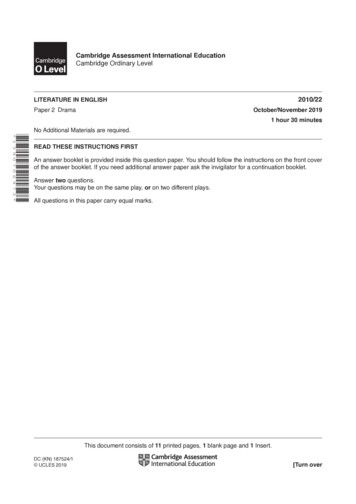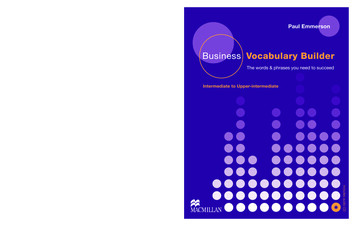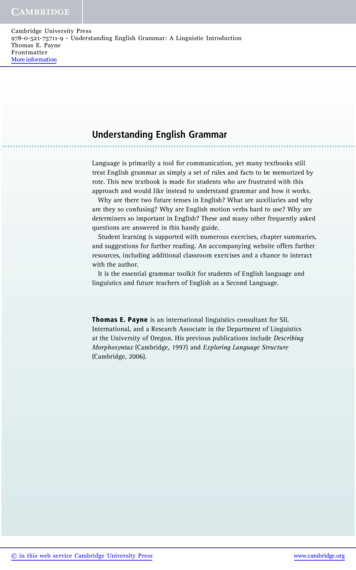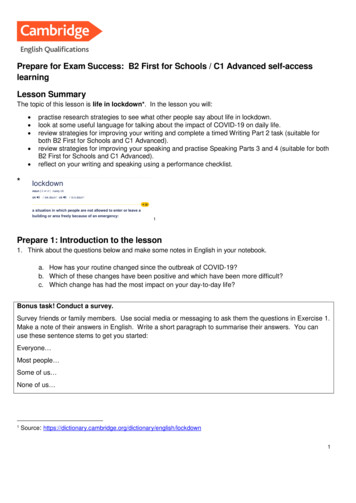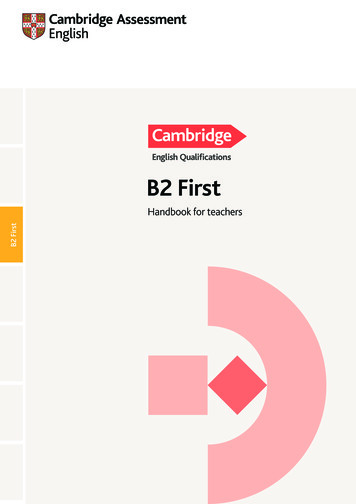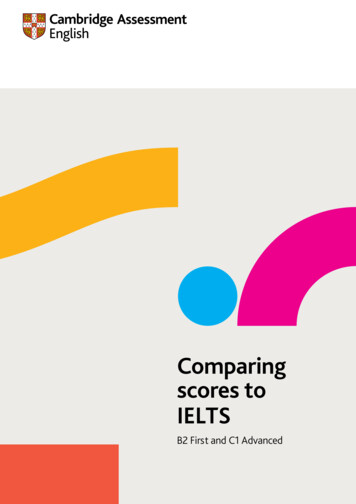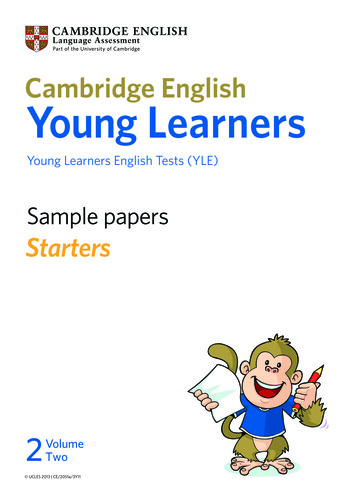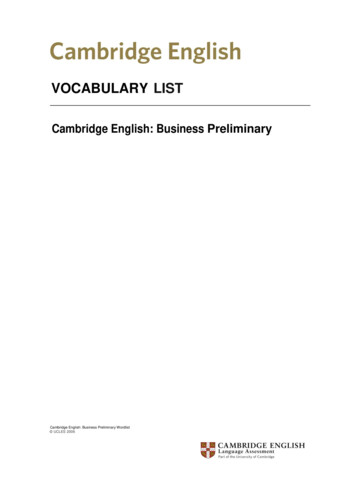
Transcription
VOCABULARY LISTCambridge English: Business PreliminaryCambridge English: Business Preliminary Wordlist UCLES 2006
Introduction to the Cambridge English: Business Preliminary WordlistThe Cambridge English: Business Preliminary Wordlist gives teachers a guide to the vocabularyneeded when preparing students for the Cambridge English: Business Preliminary examination.Background to the listThe Cambridge English: Business Preliminary Vocabulary list was originally developed by CambridgeEnglish in consultation with external consultants to guide item writers who produce materials for theCambridge English: Business Preliminary examination. It includes vocabulary from the Council ofEurope’s Threshold (1990) specification and business-related vocabulary which corpus evidence showsis high frequency.The list covers vocabulary appropriate to this level of English and includes receptive vocabulary (wordsthat the candidate is expected to understand but which is not the focus of a question), and productivevocabulary (words that the candidate needs to know to answer a question).The list does not provide an exhaustive list of all words which appear on Cambridge English:Business Preliminary question papers and candidates should not confine their study of vocabulary tothe list alone.How the list is updatedUsage of business language can change rapidly, as shown by the growth of email correspondence andassociated vocabulary in the last ten years. In order to maintain its currency, the wordlist is updated onan annual basis by the addition and removal of words, using a corpus-based approach. Suggestedadditions to the wordlist are collated and the frequency of these words is obtained by reference toestablished corpora (electronic databases). The corpora in question represent receptive and productivelanguage in business and general contexts. The main corpora used for the validation of theCambridge English: Business Preliminary wordlist are: the Cambridge Learner Corpus (CLC) which includes over 20 million words of written learnerEnglish at six levels; the British National Corpus (BNC) which incl udes 100 million words of written and spoken nativespeaker data, including four million business-oriented words; a web-derived corpus of business-related articles which includes 120,000 words from US and UKbusiness articles.How the list is organised Word setsSome categories of words which a learner at this level might be expected to know are notincluded in the alphabetical list but appear separately in Appendix 1. These include word setssuch as numbers; days of the week; months of the year; countries and languages. ExemplificationExample phrases and sentences are given only where words which can be used with differentmeanings have been restricted in the extent of their usage at Cambridge English: BusinessPreliminary level. For example, trust is exemplified as it will only be used on a CambridgeEnglish: Business Preliminary paper with the meaning of having confidence in someone orsomething, and not with the meaning of a financial arrangement (such as trust fund or trust unit). Prefixes and suffixesA list of possible prefixes and suffixes is provided in Appendix 2 and these may be combined withthe vocabulary items in the list as appropriate. Unemployment, for example, is not included onthe alphabetical list, as it is formed from a word on the list – employ – in combination with two ofthe allowable affixes – un and ment.Cambridge English: Business Preliminary Wordlist UCLES 20062
Words with an affix which is not included in the appendix appear within the alphabetical list.Reliability, for example, is listed, as the suffix – ity is not included in Appendix 2, as it isconsidered to be difficult for this level. Compound wordsCompound words are not included in the list where both individual words are present and wherethe meaning of the compound is literal and transparent, eg businessman. A similar approach hasbeen adopted for two-word and hyphenated compounds, for example, leisure centre and handmade. Multi-word verbsMulti-word verbs are not included in the list if they have a literal meaning and are composed ofverbs and particles already in the list. Examples of literal multi-word verbs are come into and sitdown. If the meaning of the verb is not transparent, eg put through, get along, the verb is listedand an example of usage given. Topic ListsAs Business English is considered to be a domain in itself, there are no separate topic lists forCambridge English: Business Preliminary.Personal VocabularyThe content of the Cambridge English: Business Preliminary wordlist is unlikely to cover completely theproductive vocabulary that may be required by all candidates. Candidates should know the specific lexisthey will need to describe themselves, their lives and their work.AbbreviationsAbbreviations used in the Vocabulary List are:abbrevadjadvAm EngBr Engconjdetexclamintnphr vplprepprep phrpronsingvabbreviation or acronymadjectiveadverbAmerican EnglishBritish nnounphrasal verbpluralprepositionprepositional phrasepronounsingularverbSummary of points to be noted The list does not include every word that may appear on a Cambridge English: BusinessPreliminary paper.The list covers receptive and productive vocabulary.Prefixes and suffixes used at this level appear in an appendix.Cambridge English: Business Preliminary Wordlist UCLES 20063
Aa.m. (before noon) (adv)abbreviation (n)ability (n)able (adj) able to goabout (adj & prep) The company has about 500employees. (adj) The report is about share prices.(prep)above (adj & prep)abroad (adv)absence (n)absent (adj)accept (v)access (n & v)accident (n)accommodation (n)accompany (v)according to (prep)account (n) I’d like to open a bank account. Our company has an account atTransport Solutions.accountancy (n)accountant (n)accounting (n)accounts (n)accuracy (n)accurate (adj)achieve (v)acknowledge (v)acquaintance (n)acquire (v)acquisition (n)across (prep)act (v)action (n) The company has reasons for itsactions. Industrial action has affectedproduction. We need to develop an action plan.active (adj)activity (n)actor (n)actual (adj)ad (abbrev) (advertisement or advert)adapt (v)add (v)addition (n) In addition, I’d like to order a newprinter.Cambridge English: Business Preliminary Wordlist UCLES 2006With his experience, he will be auseful addition to the team.additional (adj)address (n & v) Could I have your email address?(n) The MD addressed theconference. (v)adjust (v)administration (n)administrative (adj)administrator (n)admire (v)admission (n) Admission to the conference is byticket only.admit (v) He admitted there were productionproblems. This ticket admits two people to theexhibition.adult (adj & n)advance (n) Could you let me know inadvance? I’d like to make an advancebooking.advanced (adj) We need someone with advancedlevel word-processing skills.advantage (n)advert (n)advertise (v)advertising (n)advice (n)advice note (n)advise (v)aeroplane (n)affair (n) He had a lot of important affairs totake care of.affect (v)afford (v)afraid (adj)after (prep)after-sales service (n)afternoon (n)afterwards (adv)again (adv)against (prep)age (n)aged (adj)agency (n) Let’s use an advertising agency.agenda (n)agent (n) 4
I’ve been to the travel agent tobook a flight to Hong Kong. He’s our agent in Japan.ago (adv)agree (v)agricultural (adj)agriculture (n)aim (n & v) His aim was to become MD. (n) We aim to increase turnover by 5%this year. (v)air (n) He’s going by air instead of bytrain.air-conditioned (adj)air-conditioning (n)airline (n)airmail (n)airplane (n)airport (n)alarm (n) The bank installed a new securityalarm.alike (adv & adj) They think alike. (adv) The two products are very alike.(adj)all (adj, adv, det & pron)allow (v)allowance (n) holiday allowancealmost (adv)alone (adv)along (adv & prep)aloud (adv)alphabet (n)already (adv)alright (adv/adj)also (adv)alternative (n & adj)although (conj)altogether (adv)always (adv)amazing (adj)ambassador (n)ambition (n)ambitious (adj)among (amongst) (prep)amount (n)amusing (adj)analyse (v)analysis (n)and (conj)anger (n)angry (adj)Cambridge English: Business Preliminary Wordlist UCLES 2006anniversary (n) The company celebrated its 50thanniversary.announce (v)annoy (v) annual(adj) annualreport (n) annualreturn (n) another(adj) answer (n &v) answer phone(n) antique (adj &n) anxious (adj)any (adj & pron)anybody (pron)anyhow (adv)anyone (pron)anything (pron)anyway (adv)anywhere (adv)AOB (abbrev) Any Other Businessapart from (prep)apartment (n) (Am Eng)apologise (v)apology (n)appear (v)appearance (n)applicant (n)application (n)application form (n)apply (v) appoint(v) approach (n &v) What approach are you going totake? (n) We may approach the bank for aloan. (v)appropriate (adj)approval (n)approve (v)approx. (abbrev) approximate(ly)approximate (adj)architect (n)area (n) We’re looking for extrawarehousing in the Leeds area. He became area manager aftertwo years.argue (v) They argued about the marketingstrategy.arithmetic (n)around (adv & prep)arrange (v)arrival (n)arrive (v)5
art (n) The company buys and sells workof art.article (n) The newspaper article criticised thecompany.as (adv & conj)ASAP (abbrev) as soon as possibleashamed (adj)ask (v)aspect (n) What aspect of your work do youlike most?assembly (n)assembly line (n)assembly plant (n)assembly point (n)assess (v)assistant (n)associate (n & v)association (n)assure (v)at (prep)at all (prep phr) atfirst (prep phr) atlast (prep phr) atleast (prep phr) atonce (prep phr)at present (prep phr)at the same time (prep phr)attach (v)attack (n & v)attend (v)attendance (n)attempt (n & v)attention (n)attitude (n)attract (v)attraction (n)attractive (adj)audience (n)audit (v)author (n)authorise (v)authority (n)automatic (adj)availability (n)available (adj)average (adj & n) Can you find the average of thesethree numbers? (n) He’s not a particularly effective rep.– just average. (adj)avoid (v)awake (adj)award (n & v)Cambridge English: Business Preliminary Wordlist UCLES 2006She was awarded the title‘Businessperson of the Year’. (v) The court awarded damages of 5,000. (v) Our company won an award forexports. (n)aware (adj)away (adv) The MD’s away on business untilThursday. He threw away the documents bymistake. Bback (adv & n) When are you going back to work?(adv) I gave back the laptop I hadborrowed. (adv) The cables at the back of thecomputer are not connected. (n)background (n)backwards (adv)bad (adj)bag (n) baggage(n) balance (v &n) The country’s balance of paymentsis up this month because ofincreased exports. (n) The balance is due within twoweeks. (n) She spent hours trying to balancethe company’s accounts. (v) Do the books balance? (v)balance sheet (n)ballpoint (adj & n)ban (v & n)bank (n & v)bank account (n)bank balance (n)bank card (n)bank charge (n)bank clerk (n)bank loan (n)bank manager (n)bank statement (n)bank transfer (n)banking (n)banknote (n)bankrupt (v & adj)bankruptcy (n)bar (n)6
The bar chart shows sales from lastyear.bargain (n & v) Did you get a bargain? (n) Bargain with him. (v)base (n & v) Our customer base is rather weak.(n) The base rate is low so morepeople are borrowing. (n) My new job is based in centralEurope. (v) What did you base the salesprojections on? (v)basement (n)basic (adj)basis (n)basket (n)battle (n) There was a boardroom battle overstrategy.bay (n) The factory needs another loadingbay.be (v)beat (v) We can beat our competitors onquality but not price.because (conj)because of (adv)become (v)before (prep)beg (v) I beg your pardon. I begged her not to resign.begin (v)behave (v) He always behaves in aprofessional manner.behaviour (n)behind (prep & adv)believe (v) I believe we’ll win the contract. Do you believe in the product?bell (n)belong (v)below (adv & prep)bend (n & v)beneath (adv & prep)benefit (n & v) beside(adv & prep) between(prep & adv) beyond(prep)bicycle (n)big (adj) Cambridge English: Business Preliminary Wordlist UCLES 2006bike (n)bill (Am Eng) (n)billion (n)biography (n)birth (n) What’s her date of birth? (n)black (adj) The company ended the year inthe black. (n) The true size of the black economycannot be known. (adj)blame (n & v)blank (adj & n) I need a blank piece of paper. (adj) Write the correct word in eachblank. (n)blank cheque (n)blind (n) The blind needs repairing.block (n) It’s opposite the office block on thecorner.blow up (phr v)The gas heater blew up.blue (adj) There’s been a decline in thenumber of blue-collar workers.board (n & v) a noticeboard, a wooden board (n) on board a ship/aircraft (n) board a plane (v) a board of directors (n)board meeting (n)boarding card (n)boarding pass (n)board room (n)boat (n)body (n)bold (adj)bonus (n) an annual bonusbook (n & v) I’m reading a book on marketing atthe moment. (n) We’d better book a flight. (v)bookcase (n)bookkeeping (n)booking desk (n)booking form (n)booking office (n)bookshop (n)boost (n & v)boot (n) My cases are in the boot of the car.border (n & v)7
bored (adj)boring (adj)born (adj)borrow (v)boss (n)both (adj & pron)bottom (n & adj) at the bottom of the page (n) the bottom left-hand corner (adj)box (n) I ordered three boxes of floppydisks. Tick the box.brain (n)branch (n) The bank has a network ofbranches in the North.brand (n) own brand (n) brand name (n) brand-new (adj)brave (adj)break (n & v) during the (lunch) break (n) What time shall we break forlunch? (v)break down (n & phr v) Could you let me have abreakdown of last month’s salesfigures? (n) The packing machine has brokendown. (phr v)break in (n & phr v) Someone broke in to the factoryand stole some equipment. (phr v) There was a break-in at thecompany’s head office. (n)break up (phr v) The Lexford Group was broken upinto smaller companies. The glass bottles are broken upbefore entering the recyclingmachine.breakfast (n) Could
The list covers vocabulary appropriate to this level of English and includes receptive vocabulary (words that the candidate is expected to understand but which is not the focus of a question), and productive vocabulary (words that the candidate needs to know to answer a question). The list does not provide an exhaustive list of all words which appear on Cambridge English: Business Preliminary .
